初中常见的四种时态
初一英语四种时态讲解

初中英语四种时态详细讲解(适合初一学生)1.一般现在时:(1)表示经常发生(2)构成:先瞧主语主语就是三单,动词+s主语非三单,动词用原形。
They often watch TV、He often watchesTV、(3)变化:问句:主语前+do/does,动词用原形;否定:主语后+don't/doesn’t,动词用原形.Do they oftenwatch TV?They don’t often watch TV、Doeshe oftenwatch TV?He doesn’toften watchTV、2.现在进行时:a)表示现在正在发生。
句中常有now,look,listen等b)构成:主语+be+doingShe iswatchingTVnow、c)变化问句:提前be(am,is,are)Isshe watching TV now?否定:be后+notSheisn'twatching TV now、d)加ing得方法:一般直接+,去不发音得e加,闭音节双写+。
3.一般过去时:a)表示过去得动作或状态,句中常有yesterday,last等过去得时间。
b)构成:动作:主语+动词得过去式状态:主语+was/were(句中没实意动词)Shewatched TV last night、She was herelast night、c)变化:问句:主语前+did,动词用原形DidshewatchTV last night?Was she here lastnight?否定:主语后+didn’t,动词用原形.She didn’twatch TV lastnight、She wasn’t watch TV last night、(4)过去式:一般+ed;e结尾+d;辅音+y得,去y+ied;闭音节双写+ed;不规则得120页。
4.一般将来时:a)表示:将来,句中有表示将来得时间:tomorrow、next、soon,intwo days等b)构成A:主语+will+do(任何人称)B:主语+shall+do(仅第一人称I,we)C:主语+be going to +do 如:A:Shewillwatch TV this evening、B:Weshallwatch TV this evening、C:She is going to watch TV this evening、c)变化问句:提前will/shall/beA:Will she watch TV this…?B:ShallwewatchTV …?C:Isshe going towatch…?否定:在will/shall/be 后+notA: She won't watch TV…B:We shall notwatch…shan'tC:She isn’t going to watch…There is a meeting next week、Therewas a meetingyesterday、There will be a meeting next…=Thereisgoing tobeameeting next …。
初中英语时态知识点总结人教版
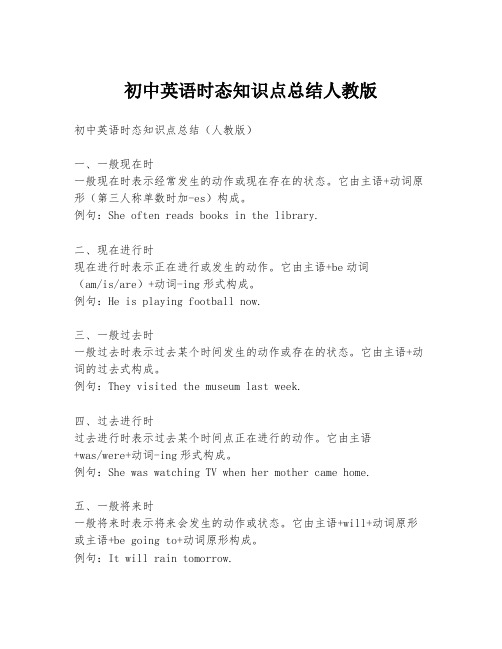
初中英语时态知识点总结人教版初中英语时态知识点总结(人教版)一、一般现在时一般现在时表示经常发生的动作或现在存在的状态。
它由主语+动词原形(第三人称单数时加-es)构成。
例句:She often reads books in the library.二、现在进行时现在进行时表示正在进行或发生的动作。
它由主语+be动词(am/is/are)+动词-ing形式构成。
例句:He is playing football now.三、一般过去时一般过去时表示过去某个时间发生的动作或存在的状态。
它由主语+动词的过去式构成。
例句:They visited the museum last week.四、过去进行时过去进行时表示过去某个时间点正在进行的动作。
它由主语+was/were+动词-ing形式构成。
例句:She was watching TV when her mother came home.五、一般将来时一般将来时表示将来会发生的动作或状态。
它由主语+will+动词原形或主语+be going to+动词原形构成。
例句:It will rain tomorrow.六、将来进行时将来进行时表示将来某个时间点正在进行的动作。
它由主语+will be+动词-ing形式构成。
例句:He will be working at this time tomorrow.七、现在完成时现在完成时表示过去发生的动作对现在造成的影响或结果,或者是从过去开始一直持续到现在的动作。
它由主语+have/has+动词的过去分词构成。
例句:I have finished my homework.八、现在完成进行时现在完成进行时表示从过去某一时间开始,一直持续到现在并可能继续下去的动作。
它由主语+have/has been+动词-ing形式构成。
例句:She has been studying English for five years.九、过去完成时过去完成时表示在过去某个时间点之前已经完成的动作。
英语四种时态
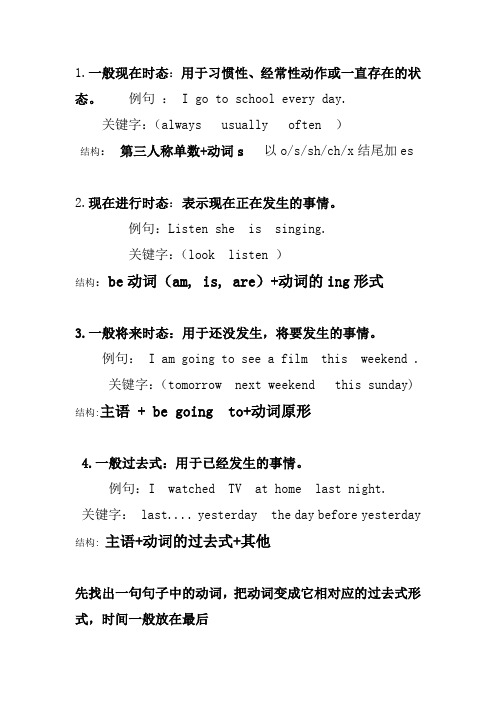
1.一般现在时态:用于习惯性、经常性动作或一直存在的状态。
例句: I go to school every day.
关键字:(always usually often )
结构:第三人称单数+动词s 以o/s/sh/ch/x结尾加es
2.现在进行时态:表示现在正在发生的事情。
例句:Listen she is singing.
关键字:(look listen )
结构:be动词(am, is, are)+动词的ing形式
3.一般将来时态:用于还没发生,将要发生的事情。
例句: I am going to see a film this weekend .
关键字:(tomorrow next weekend this sunday) 结构:主语+ be going to+动词原形
4.一般过去式:用于已经发生的事情。
例句:I watched TV at home last night.
关键字: last.... yesterday the day before yesterday 结构: 主语+动词的过去式+其他
先找出一句句子中的动词,把动词变成它相对应的过去式形式,时间一般放在最后。
初中八大时态总结
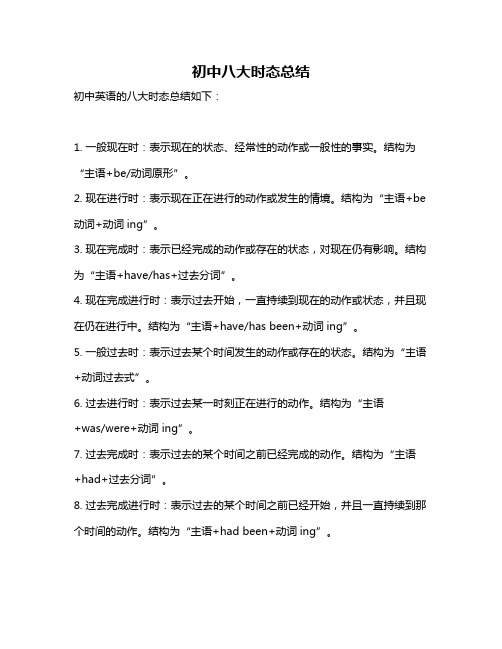
初中八大时态总结
初中英语的八大时态总结如下:
1. 一般现在时:表示现在的状态、经常性的动作或一般性的事实。
结构为“主语+be/动词原形”。
2. 现在进行时:表示现在正在进行的动作或发生的情境。
结构为“主语+be 动词+动词ing”。
3. 现在完成时:表示已经完成的动作或存在的状态,对现在仍有影响。
结构为“主语+have/has+过去分词”。
4. 现在完成进行时:表示过去开始,一直持续到现在的动作或状态,并且现在仍在进行中。
结构为“主语+have/has been+动词ing”。
5. 一般过去时:表示过去某个时间发生的动作或存在的状态。
结构为“主语+动词过去式”。
6. 过去进行时:表示过去某一时刻正在进行的动作。
结构为“主语
+was/were+动词ing”。
7. 过去完成时:表示过去的某个时间之前已经完成的动作。
结构为“主语+had+过去分词”。
8. 过去完成进行时:表示过去的某个时间之前已经开始,并且一直持续到那个时间的动作。
结构为“主语+had been+动词ing”。
以上是初中英语八大时态的总结,希望对你有所帮助。
英语四种时态+常见短语
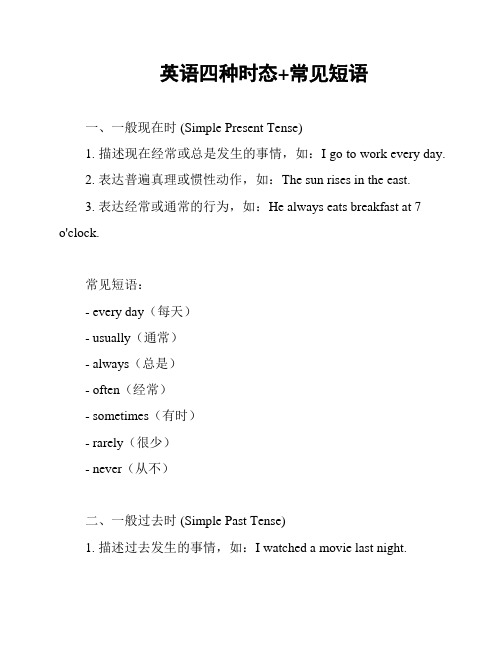
英语四种时态+常见短语一、一般现在时 (Simple Present Tense)1. 描述现在经常或总是发生的事情,如:I go to work every day.2. 表达普遍真理或惯性动作,如:The sun rises in the east.3. 表达经常或通常的行为,如:He always eats breakfast at 7o'clock.常见短语:- every day(每天)- usually(通常)- always(总是)- often(经常)- sometimes(有时)- rarely(很少)- never(从不)二、一般过去时 (Simple Past Tense)1. 描述过去发生的事情,如:I watched a movie last night.2. 表达过去常常发生的动作,如:He often went fishing when he was young.3. 表达过去的惯,如:We lived in that house for many years.常见短语:- yesterday(昨天)- last night(昨晚)- a week ago(一周前)- in the past(在过去)- when I was young(在我年轻的时候)- for many years(多年来)- in those days(在那些日子里)三、一般将来时 (Simple Future Tense)1. 表达将来会发生的事情,如:I will visit my grandparents next week.2. 表示打算或计划做的事情,如:We are going to have a party on Saturday.3. 表达预测的事件,如:I think he will win the game.常见短语:- next week(下周)- in the future(在未来)- tomorrow(明天)- on Saturday(在星期六)- be going to(打算)- will(将)- I think(我认为)四、现在进行时 (Present Continuous Tense)1. 描述现在正在发生的事情,如:She is studying in the library right now.2. 表达将来安排好的事情,如:We are leaving for a vacation next month.3. 表示暂时的情况,如:He is living with his sister while his house is being renovated.常见短语:- right now(现在)- at the moment(此刻)- in the near future(不久的将来)- next month(下个月)- while(在...期间)- currently(目前)- at present(现在)以上是英语中四种常见的时态以及常见的短语,掌握这些时态和短语可以帮助你更准确地表达过去、现在和将来的事件和状态。
初中英语主要的时态
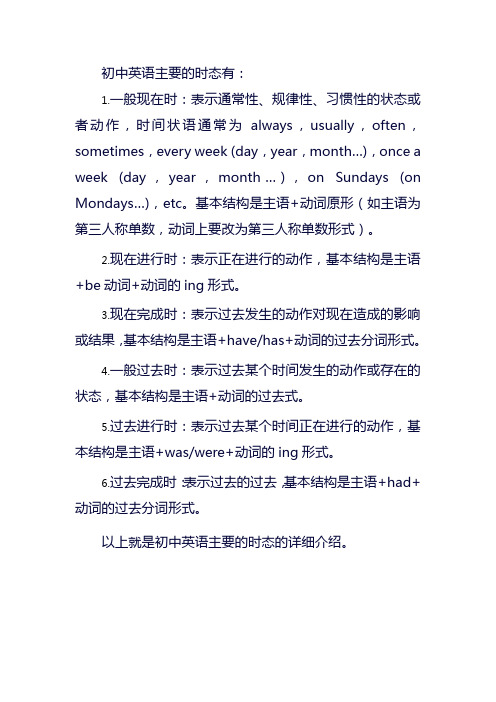
初中英语主要的时态有:
1.一般现在时:表示通常性、规律性、习惯性的状态或者动作,时间状语通常为always,usually,often,sometimes,every week (day,year,month…),once a week (day,year,month…),on Sundays (on Mondays…),etc。
基本结构是主语+动词原形(如主语为第三人称单数,动词上要改为第三人称单数形式)。
2.现在进行时:表示正在进行的动作,基本结构是主语+be动词+动词的ing形式。
3.现在完成时:表示过去发生的动作对现在造成的影响或结果,基本结构是主语+have/has+动词的过去分词形式。
4.一般过去时:表示过去某个时间发生的动作或存在的状态,基本结构是主语+动词的过去式。
5.过去进行时:表示过去某个时间正在进行的动作,基本结构是主语+was/were+动词的ing形式。
6.过去完成时:表示过去的过去,基本结构是主语+had+动词的过去分词形式。
以上就是初中英语主要的时态的详细介绍。
初中英语8个时态归纳总结
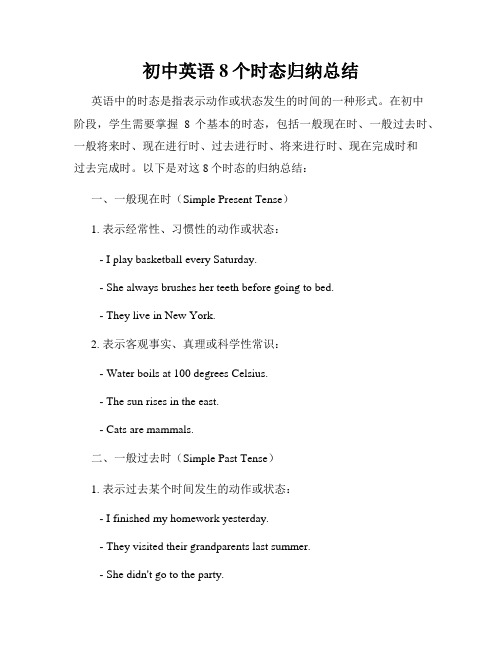
初中英语8个时态归纳总结英语中的时态是指表示动作或状态发生的时间的一种形式。
在初中阶段,学生需要掌握8个基本的时态,包括一般现在时、一般过去时、一般将来时、现在进行时、过去进行时、将来进行时、现在完成时和过去完成时。
以下是对这8个时态的归纳总结:一、一般现在时(Simple Present Tense)1. 表示经常性、习惯性的动作或状态:- I play basketball every Saturday.- She always brushes her teeth before going to bed.- They live in New York.2. 表示客观事实、真理或科学性常识:- Water boils at 100 degrees Celsius.- The sun rises in the east.- Cats are mammals.二、一般过去时(Simple Past Tense)1. 表示过去某个时间发生的动作或状态:- I finished my homework yesterday.- They visited their grandparents last summer.- She didn't go to the party.2. 表示过去的经历或习惯:- When I was young, I often went swimming. - He always ate breakfast at 8 o'clock.三、一般将来时(Simple Future Tense)1. 表示将来要发生的动作或事件:- I will go shopping tomorrow.- They are going to have a picnic next week. - She won't be late for the meeting.2. 表示将来的打算或意愿:- I am going to be a doctor when I grow up.- We will help you with your project.四、现在进行时(Present Continuous Tense)1. 表示现在正在进行的动作:- We are studying English at the moment.- He is playing soccer with his friends.- They aren't watching TV right now.2. 表示现阶段的趋势或变化:- The population is increasing rapidly.- More and more people are using smartphones.五、过去进行时(Past Continuous Tense)1. 表示过去某一时间段内正在进行的动作:- I was reading a book when the phone rang.- They were cooking dinner at 7 o'clock.2. 表示过去的同时发生的两个动作:- She was listening to music while doing her homework.六、将来进行时(Future Continuous Tense)1. 表示将来某一时间段内正在进行的动作:- Tomorrow, they will be flying to Paris.- I will be waiting for you at the station.2. 表示将来的预测或计划:- This time next month, I will be studying for my exams.七、现在完成时(Present Perfect Tense)1. 表示过去某一时间发生的动作对现在造成的影响或结果: - I have finished my homework, so I can watch TV now.- She has already eaten lunch.2. 表示过去某一时间内多次发生的动作:- We have visited that museum several times.八、过去完成时(Past Perfect Tense)1. 表示过去某一时间点之前已经完成的动作:- By the time they arrived, we had already left.- I had finished my work before the deadline.2. 表示过去的顺序或先后关系:- She realized that she had forgotten her keys after she locked the door.以上是初中英语的8个时态的归纳总结。
四种基本时态
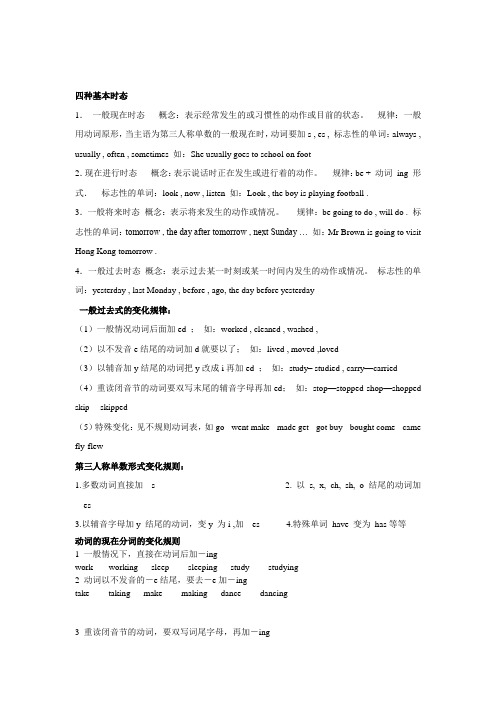
四种基本时态1.一般现在时态概念:表示经常发生的或习惯性的动作或目前的状态。
规律:一般用动词原形,当主语为第三人称单数的一般现在时,动词要加s , es , 标志性的单词:always , usually , often , sometimes 如:She usually goes to school on foot2.现在进行时态概念:表示说话时正在发生或进行着的动作。
规律:be + 动词ing 形式.标志性的单词:look , now , listen 如:Look , the boy is playing football .3.一般将来时态概念:表示将来发生的动作或情况。
规律:be going to do , will do . 标志性的单词:tomorrow , the day after tomorrow , next Sunday … 如:Mr Brown is going to visit Hong Kong tomorrow .4.一般过去时态概念:表示过去某一时刻或某一时间内发生的动作或情况。
标志性的单词:yesterday , last Monday , before , ago, the day before yesterday一般过去式的变化规律:(1)一般情况动词后面加ed ;如:worked , cleaned , washed ,(2)以不发音e结尾的动词加d就要以了;如:lived , moved ,loved(3)以辅音加y结尾的动词把y改成i再加ed ;如:study– studied , carry—carried (4)重读闭音节的动词要双写末尾的辅音字母再加ed;如:stop—stopped shop—shopped skip--- skipped(5)特殊变化:见不规则动词表,如go - went make - made get - got buy - bought come - came fly-flew第三人称单数形式变化规则:1.多数动词直接加---s2. 以s, x, ch, sh, o 结尾的动词加---es3.以辅音字母加y 结尾的动词,变y 为i ,加---es4.特殊单词have 变为has等等动词的现在分词的变化规则1 一般情况下,直接在动词后加-ingwork ---- working sleep ----- sleeping study ----- studying2 动词以不发音的-e结尾,要去-e加-ingtake ----- taking make ----- making dance ----- dancing3 重读闭音节的动词,要双写词尾字母,再加-ingcut ----- cutting put ----- putting begin ------ beginning4 以-ie结尾的动词,把变成y再加-inglie ----- lying tie ----- tying die ----- dying可数名词的复数变化规则:1.一般情况加s :book-- books mouth---mouths house---houses girl---girls2.以s 、sh 、ch 、x结尾的加es :class--- classes box----boxes match----matches3.辅音字母+ y结尾的变y为i加es:city---cities country----countries party----parties factory----factories4.以o 结尾的词+es的只有以下词:heroes Negroes tomatoes potatoeszeroes/zeros以o 结尾并且词尾有两个元音字母+s :radios, zoos, bamboos ,(pianos ,kilos photos) 5.以f,fe 结尾的变f或fe为v +es : thief wife life knife wolf half leaf shelf。
初中英语四种时态归纳总结
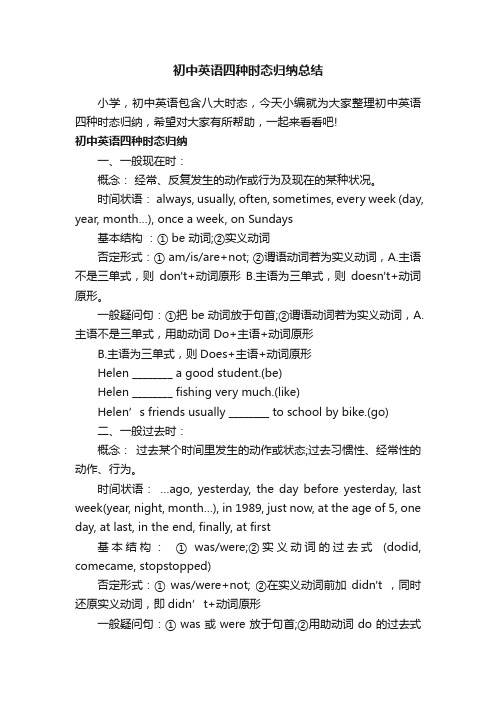
初中英语四种时态归纳总结小学,初中英语包含八大时态,今天小编就为大家整理初中英语四种时态归纳,希望对大家有所帮助,一起来看看吧!初中英语四种时态归纳一、一般现在时:概念:经常、反复发生的动作或行为及现在的某种状况。
时间状语: always, usually, often, sometimes, every week (day, year, month…), once a week, on Sundays基本结构:① be 动词;②实义动词否定形式:① am/is/are+not; ②谓语动词若为实义动词,A.主语不是三单式,则don't+动词原形B.主语为三单式,则doesn't+动词原形。
一般疑问句:①把 be 动词放于句首;②谓语动词若为实义动词,A.主语不是三单式,用助动词 Do+主语+动词原形B.主语为三单式,则Does+主语+动词原形Helen ________ a good student.(be)Helen ________ fishing very much.(like)Helen’s friends usually ________ to school by bike.(go)二、一般过去时:概念:过去某个时间里发生的动作或状态;过去习惯性、经常性的动作、行为。
时间状语:…ago, yesterday, the day before yesterday, last week(yea r, night, month…), in 1989, just now, at the age of 5, one day, at last, in the end, finally, at first基本结构:① was/were;②实义动词的过去式(dodid, comecame, stopstopped)否定形式:① was/were+not; ②在实义动词前加didn't ,同时还原实义动词,即didn’t+动词原形一般疑问句:① was 或 were 放于句首;②用助动词 do 的过去式did 提问,同时还原实义动词。
四种常用时态

四种常用时态1.一般现在时(1)表示经常发生的动作或事情,通常用“usually, often, every day, sometimes,always,never”等词。
(2)基本结构:I / You / We / They He / She / It肯定句(Positive)动词原形(V)动词第三人称单数形式(V+S)否定句(Negative) don’t + 动词doesn’t + 动词原形一般疑问句(Yes/No) Do… ? Yes, I do. Does…(动词原形)…?No,she doesn’t.特殊疑问句(wh-) What do …? How does she…(动词原形)…?(3) 动词第三人称单数形式a. Most verbs +s walk-walksb. Verbs ending in a consonant +y -y +ies fly-fliesc. Verbs ending in s, sh, ch or x +es watch-watchesd. Others do-does ,have-has, go-goes2.现在进行时,(1)表示正在发生的动作,通常用“now,look”.(2)基本形式: be + 动词+ingeg: I am(not) doing my homework.You/We/They are(not) reading.He/She/It is(not) eating.What are you doing?Is he reading?(3)动词的现在分词形式(do+ing)Mostverbs +ing walk—walking Verbs ending in e -e + ing come—comingShort verbs ending in a vowel + a consonant Doubleconsonant run-runningswim-swimming3. 一般过去时态(1)表示过去已经发生的事情,通常用“last week, just now, yesterday”等词。
初中语文6大时态
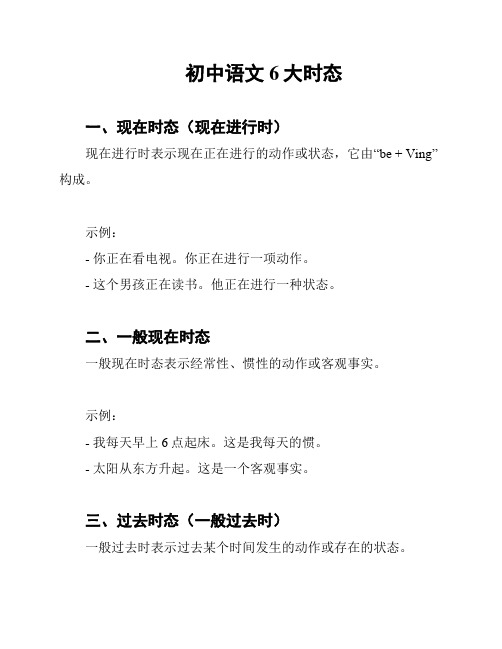
初中语文6大时态一、现在时态(现在进行时)现在进行时表示现在正在进行的动作或状态,它由“be + Ving”构成。
示例:- 你正在看电视。
你正在进行一项动作。
- 这个男孩正在读书。
他正在进行一种状态。
二、一般现在时态一般现在时态表示经常性、惯性的动作或客观事实。
示例:- 我每天早上6点起床。
这是我每天的惯。
- 太阳从东方升起。
这是一个客观事实。
三、过去时态(一般过去时)一般过去时表示过去某个时间发生的动作或存在的状态。
示例:- 昨天他去了北京。
这是发生过的动作。
- 这个地方曾经是一片森林。
这是过去的状态。
四、将来时态(一般将来时)一般将来时表示将来某个时间发生的动作或存在的状态。
示例:- 我明天会去看电影。
这是一个计划的动作。
- 明年我们将会有一次家庭聚会。
这是将来会发生的状态。
五、过去进行时过去进行时表示在过去某个时间正在进行的动作或状态。
示例:- 我昨天下午2点正在写字。
这是过去正在进行的动作。
- 她在去年的这个时候正在旅行。
这是过去正在进行的状态。
六、现在完成时现在完成时表示过去发生的动作对现在造成的影响或结果。
示例:- 我已经吃过午饭了。
现在我不饿了。
- 他已经做完功课了。
现在他可以玩游戏了。
以上就是初中语文中的6大时态。
不同的时态可以用来描述不同的动作或状态,在写作中我们可以根据需要灵活运用这些时态,使文句更加准确和生动。
初中英语所有时态

初中英语所有时态1.一般现在时(do/does; is/am/are)①表示现在的情况、状态或特征。
例:He is a student.他是一个学生。
②表示经常性、习惯性动作。
例:He always helps others.他总是帮助别人。
③客观事实和普遍真理。
例:The earth moves the sun.地球绕着太阳转。
④表示一个按规定、计划或安排要发生的动作。
仅限于某些表示“来、去、动、停、开始、结束、继续”等的动词,可以与表示未来时间的状语搭配使用。
常见的用法是:飞机、火车、轮船、汽车等定期定点运行的交通方式。
例:The next train leaves at 3 o'clock this afternoon.下一趟火车今天下午3点开车。
⑤在时间、条件和让步状语从句中经常用一般现在(有时也用现在完成时)表示将的来事情。
(即:主将从现原则)例:I will call you as soon as I arrive at the airport.我一到机场就会给你打电话。
When you have finished the report, I will have waited for about 3 hours.等你完成这份报告的时候,我就已经等了将近3个小时了。
2. 现在进行时(am/is/are doing)①表示此时此刻正在发生的事情。
例:He is listning to the music now.他现在正在听音乐。
②表示目前一段时间内一直在做的事情,但不一定此时此刻正在做。
例:I am studying computer this term.这个学期我一直在学习计算机。
③现在进行时可以表示将来的含义。
瞬时动词的进行一定表将来。
例:I am leaving.我要离开了。
持续动词的进行只有有将来的时间状语或有将来语境中才表将来。
例:I am travelling next month.下个月我要去旅行。
初一上四大时态知识点归纳总结

初一上四大时态知识点归纳总结一、什么是时态?时态是指动词所表示的动作或状态在时间上的不同变化。
英语中常用的四大时态包括现在时态、过去时态、将来时态和完成时态。
二、现在时态1. 一般现在时(Simple Present)- 表示经常性或习惯性的动作或状态:I play basketball every weekend.- 表示现阶段的状况或真理:The sun rises in the east.2. 现在进行时(Present Continuous)- 表示目前正在进行的动作:She is studying in her room.- 表示现阶段暂时的情况:I'm staying at my friend's house while my house is being renovated.三、过去时态1. 一般过去时(Simple Past)- 表示过去某个时间发生的动作或状态:He finished his homework yesterday.- 表示过去的经常性或习惯性动作:I often went fishing with my dad when I was young.2. 过去进行时(Past Continuous)- 表示过去某个时间正在进行的动作:They were playing soccer when it started to rain.- 表示过去某个时间暂时的情况:She was living in Paris for six months.四、将来时态1. 将来时(Simple Future)- 表示将来某个时间要发生的动作:They will arrive at 8 pm tomorrow.- 表示将来的计划、安排或意愿:I will help you with your project.2. 将来进行时(Future Continuous)- 表示将来某个时间正在进行的动作:This time tomorrow, I will be flying to New York.- 表示将来某个时间暂时的情况:She will be staying at a hotel until her new house is ready.五、完成时态1. 现在完成时(Present Perfect)- 表示过去发生并与现在有关的动作:I have finished my homework.- 表示经历过的经验或已完成的动作:He has visited Paris twice.2. 过去完成时(Past Perfect)- 表示过去某个时间之前已经发生的动作:She had already eaten when I arrived.- 表示过去的经历或经验:By the time they reached the theater, the show had already started.3. 将来完成时(Future Perfect)- 表示将来某个时间之前将会完成的动作:By this time next year, I will have graduated from university.- 表示对将来的预测或推测:They will have finished the project by tomorrow.总结:初一上学期所学的四大时态包括现在时态、过去时态、将来时态和完成时态。
初一四种基本英语时态

1.一般现在时:1)一般现在时表示经常发生或习惯性的动作或状态及客观现实和普遍真理。
一般现在时常以动词原形表示,但当主语是第三人称单数时,动词词尾加-s或-es。
2)句型结构:主语+V.(包括be动词)+宾语+…She is an engineer.He has breakfast at 6:00every day.3)注意:a)一般现在时通常与always , often , usually , every day , sometimes , once a week 等时间状语连用。
I always watch TV at 8:00 in the evening. They go home once a week.We usually do our homework at home.b)表客观现实或普遍真理。
The sun always rises in the east. The light travels faster than the sound.c)表永远性的动作或状态。
He lives in the country.4)第三人称单数变化形式。
a)一般情况动词在词尾加-s .come---comes speak---speaks work---works live---livesb)以o, s, x, ch, sh结尾的单词在词后加-es.do---does go---goes finish---finishes brush---brushes fix---fixes pass---passes watch---watchesc)以“辅音字母+y”结尾的单词变y为i加-es.Study---studies carry-carries cry---criesd)以“元音字母+y”结尾的单词直接加-s.Play---plays stay---stays5)否定句和疑问句。
Eg:a)-----He is an engineer.-----He isn’t an engineer.-----Is he an engineer?-----Yes, he is. / No, he isn’t.b) ----We get up at 7:30 in the morning.-----We don’t get up at 7:30 in the morning .-----Do you get up at 7:30 in the morning?-----Yes, we do. / No, we don’t.c) ----He likes music.-----He doesn’t like music.-----Does he like music?-----Yes ,he does./ No, he doesn’t练习:我们每天晚上九点做作业。
初中英语时态总结
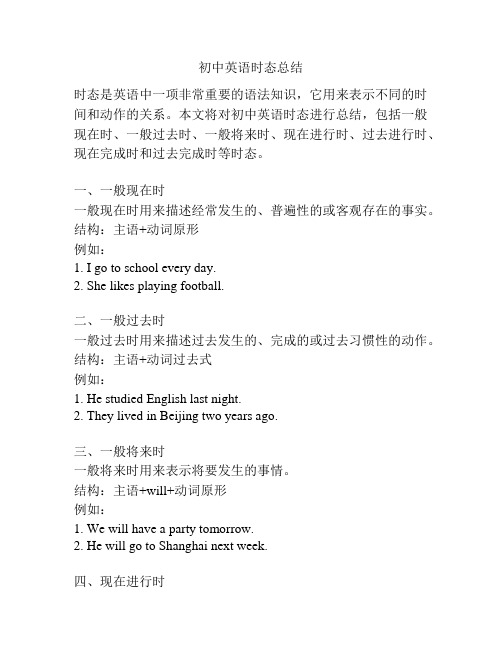
初中英语时态总结时态是英语中一项非常重要的语法知识,它用来表示不同的时间和动作的关系。
本文将对初中英语时态进行总结,包括一般现在时、一般过去时、一般将来时、现在进行时、过去进行时、现在完成时和过去完成时等时态。
一、一般现在时一般现在时用来描述经常发生的、普遍性的或客观存在的事实。
结构:主语+动词原形例如:1. I go to school every day.2. She likes playing football.二、一般过去时一般过去时用来描述过去发生的、完成的或过去习惯性的动作。
结构:主语+动词过去式例如:1. He studied English last night.2. They lived in Beijing two years ago.三、一般将来时一般将来时用来表示将要发生的事情。
结构:主语+will+动词原形例如:1. We will have a party tomorrow.2. He will go to Shanghai next week.四、现在进行时现在进行时用来描述现在正在进行的动作或状态。
结构:主语+be(am, is, are)+动词-ing例如:1. She is studying for the test now.2. They are playing basketball in the park.五、过去进行时过去进行时用来描述过去某个时间正在进行的动作。
结构:主语+was/were+动词-ing例如:1. I was studying when she called me.2. They were cooking dinner at 7 o'clock yesterday.六、现在完成时现在完成时用来表示过去发生的动作对现在造成的影响或与现在相关的动作。
结构:主语+have/has+动词过去分词例如:1. He has finished his homework.2. We have visited the Great Wall.七、过去完成时过去完成时用来表示过去某个时间或动作之前已经完成的动作。
初中英语时态详细版

初中英语时态讲解初中英语时态主要包括以下几种:1. 一般现在时(Simple Present Tense):表示经常性、习惯性或普遍性的动作或状态。
例如:I play football every weekend.(我每个周末都踢足球)2. 一般过去时(Simple Past Tense):表示过去某个时间发生的动作或状态。
例如:She watched a movie last night.(她昨晚看了一部电影)3. 一般将来时(Simple Future Tense):表示将来要发生的动作或状态。
例如:We will have a meeting tomorrow.(我们明天将开会)4. 现在进行时(Present Continuous Tense):表示现在正在进行的动作。
例如:He is studying in the library.(他正在图书馆学习)5. 过去进行时(Past Continuous Tense):表示过去某个时间正在进行的动作。
例如:They were playing basketball at that time.(他们那时正在打篮球)6. 将来进行时(Future Continuous Tense):表示将来某个时间正在进行的动作。
例如:I will be watching a movie at 8 o'clock tomorrow evening.(明天晚上8点我将在看电影)7. 现在完成时(Present Perfect Tense):表示过去发生的动作对现在造成的影响或结果。
例如:She has finished her homework.(她已经完成了她的作业)8. 过去完成时(Past Perfect Tense):表示过去某个时间或动作之前已经完成的动作。
例如:I had already eaten when you called.(你打电话时我已经吃完了)9. 将来完成时(Future Perfect Tense):表示将来某个时间或动作之前已经完成的动作。
初一四种时态
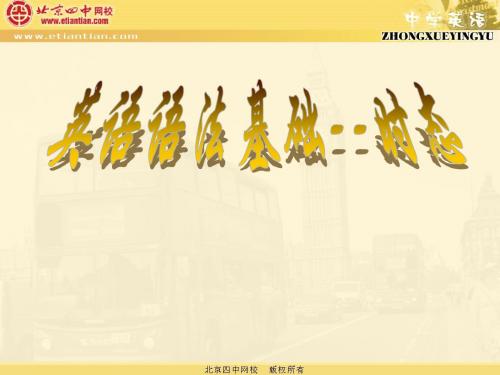
• 1. The old man gets up at six o’clock in the morning every day. • 2. We are going to do/will do some sightseeing tomorrow because we like Chinese culture. • 3. Tony will take/ is going to take a test next week. • 4. They will have/ are going to have a party with their friends the day after tomorrow. • 5. They are staying in a hotel in San Francisco at the moment, but they are moving to another hotel very soon.
(二). 现在进行时
• [语法讲解] • 1. 现在进行时的基本用法: • 1) 表示说话时正在进行的动作: 常和now look、listen、at the moment等。 • What is your father doing now? Look!A dog is running after a cat. Listen!He is playing the piano.
(三). 一般将来时
• 1.一般将来时的基本概念: 一般将来时表示将来某一时刻的动作或 状态,或将来某一段时间内经常的动作 或状态。一般将来时由助动词shall(第 一人称),will/be going to(各种人 称)+动词原形构成。
• 2.时间状语连用,如: tomorrow, next week, from now on, in the future等。
初中时态总结
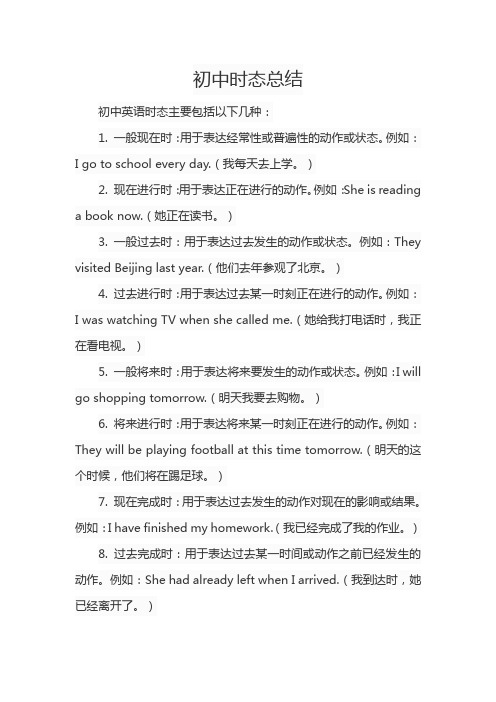
初中时态总结
初中英语时态主要包括以下几种:
1. 一般现在时:用于表达经常性或普遍性的动作或状态。
例如:
I go to school every day.(我每天去上学。
)
2. 现在进行时:用于表达正在进行的动作。
例如:She is reading
a book now.(她正在读书。
)
3. 一般过去时:用于表达过去发生的动作或状态。
例如:They visited Beijing last year.(他们去年参观了北京。
)
4. 过去进行时:用于表达过去某一时刻正在进行的动作。
例如:
I was watching TV when she called me.(她给我打电话时,我正在看电视。
)
5. 一般将来时:用于表达将来要发生的动作或状态。
例如:I will go shopping tomorrow.(明天我要去购物。
)
6. 将来进行时:用于表达将来某一时刻正在进行的动作。
例如:They will be playing football at this time tomorrow.(明天的这个时候,他们将在踢足球。
)
7. 现在完成时:用于表达过去发生的动作对现在的影响或结果。
例如:I have finished my homework.(我已经完成了我的作业。
)
8. 过去完成时:用于表达过去某一时间或动作之前已经发生的动作。
例如:She had already left when I arrived.(我到达时,她已经离开了。
)。
- 1、下载文档前请自行甄别文档内容的完整性,平台不提供额外的编辑、内容补充、找答案等附加服务。
- 2、"仅部分预览"的文档,不可在线预览部分如存在完整性等问题,可反馈申请退款(可完整预览的文档不适用该条件!)。
- 3、如文档侵犯您的权益,请联系客服反馈,我们会尽快为您处理(人工客服工作时间:9:00-18:30)。
一般现在时讲解及练习一、定义与讲解一般现在时:表示经常性的事情,经常性的动作或一般性事实。
时间状语:often 经常,usually通常,always 总是,every每个,sometimes 有时,once a week一周一次;twice a month一个月两次只有在第三人称单数用动词的“三单变化”,其他用动词的原形。
三单变化:(1)直接在动词词尾加-s. ask---asks work---works get---gets stay---stays(2)以字母s, x, ch, sh或o结尾的动词,在词尾直接加-es.watch---watches wish---wishes fix---fixes do---does go---goes pass---passes (3)以“辅音字母加- y”结尾的动词,要先变y为i再加-es.try---tries study---studies cry---cries fly---flies(4).不规则变化:be---- is are have----has二、一般现在时用法1. 表示经常性,习惯性,永久性的动作或存在的状态.通常与副词sometimes, often, usually, always,every day (year, month ), once (twice, three times) a day,等时间状语连用。
They usually go to school by bike.I take the medicine three times a day.She helps her mother once a week.Mary’s father is a policeman.There are 50 students in my class。
2. 表示客观真理,科学原理,自然现象,等客观事实或格言,谚语等。
The sun rises in the east and sets in the west every day.The man who has never been to the Great Wall is not a real man.Tomorrow is Tuesday.三、一般现在时的句子转换:(1)当句子中有be动词或情态动词时,则把be动词或情态动词(can,could等等)提到主语的前面变成疑问句;在be动词或情态动词后面加not变成否定句.例:①陈述句:She is a student.疑问句→ Is she a student?否定句→ She is not a student.②陈述句:I can swim.疑问句→ Can you swim否定句→ I can not swim.(2)当句子中即没有be动词,也没有情态动词时,则在主语前加助动词do (you,以及复数), doe s(单数she,he,it)变成问句;在主语后谓语动词前加助动词don’t(I,you,以及复数), doesn’t(单数she, he,it)变成否定句,助动词后的动词要变成动词原形。
例:①陈述句:We get up at 7:00 every morning.疑问句→Do you get up at 7:00 every morning?否定句→We don’t get up at7:00 every morning.②陈述句:She has a little brother.疑问句→ Does she have a little brother?否定句→ She doesn’t have a little brother.(一).用动词的适当形式填空1. She _________(go) to school at seven o’clock.2. It’s 6o’clock. They are _________ (eat) suppe r.3. He usually ___________ up at 17:00.(get )4. She ___________ (live) in Beijing.5. Amy _________ (be) here just now.6. _______ (be)there a fly on the table just now?7. My father __________ (watch) TV every evening .8. My father _______________ (make) toys these days.9.________ Amy _________ (read) English every day?10. Chen Jie sometimes _________(go)to the park with her sister.(二).选择填空1.I want____homework now. A. doing B. to do C. to do my D. do my 2.It's time______.A. go to schoolB. play gamesC. to go homeD. to do my homeworks 3.______go and help her. A. Let's me B. Let's us C. Let's D. Let's to 4.Do they have a new car? Yes,_____.A .they are B.they have C. they don't D. they do5.He often _________ supper at 6:00 in the evening.A. haveB. has c. is having D. is eating6. We _____________ any Chinese classes on Friday.A. are havingB. aren’t havingC. don’t haveD. are have(三)、用括号内动词的适当形式填空。
1. He often _________ (have) dinner at home.2. Daniel and Tommy _________ (be) in Class One.3. We _________ (not watch) TV on Monday.4. Nick_________ (not go) to the zoo on Sunday.5. they _________ (like) the World Cup?6. What they often_________ (do) on Saturdays?7. your parents _________ (read) newspapers every day?8. The girl _________ (teach) us English on Sundays.9. She and I _________ (take) a walk together every evening.10. There _________ (be) some water in the bottle.11. Mike_________ (like) cooking.12. They _________ (have) the same hobby.13. My aunt _________ (look) after her baby carefully.14. You always _________ (do) your homework well.15. I _________ (be) ill. I’m staying in bed.16. She _________ (go) to school from Monday to Friday.17. Liu Tao _________ (do) not like PE.18. The child often _________ (watch) TV in the evening.19. Wang Kai and Wang li_________ (have) eight lessons this term.20. -What day _________ (be) it today? -It’s S aturday.1. We often___________(play) in the playgound.2. He _________(get) up at six o’clock.3. __________you _________(brush) your teeth every morning.4. What __________(do) he usually (do) after school?5. Danny__________(study) English,Chinese,Maths,Science and Art an school.6. Mike sometimes __________(go) to the park with his sister.7. At eight at night, she __________(watch) TV with his parents.8. ________ Mike________(read) English every day?9. How many lessons_________your classmate________(have) on Monday?10.What time_________his mother_________(do) the housework?1. Do you often play football after school? (肯定回答)2. I have many books. (改为否定句)3. Gao Shan’s sister likes playing table tennis (改为否定句)4. She lives in a small town near New York. (改为一般疑问句)5. I watch TV every day. (改为一般疑问句)6. David has got a goal. (改为一般疑问句)7. We have four lessons.(否定句)8. Nancy doesn’t run fast (肯定句)9. My dog runs fast. 否定句:一般疑问句:10. Mike has two letters for him.一般疑问句:否定句:11. I usually play football on Friday afternoon.否定句:一般疑问句:划线部分提问12. Su Yang usually washes some clothes on Saturday.否定句:一般疑问句:划线提问:13. Mingming usually waters the flowers every day否定句:一般疑问句:划线提问14. Tom does his homework at home.否定句:一般疑问句:划线提问一般过去时态讲解及练习1.一般过去时表示过去某个时间发生的动作或存在的状态,常和表示过去的时间状语连用。
